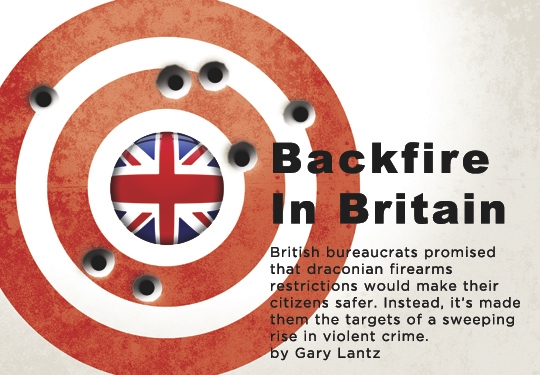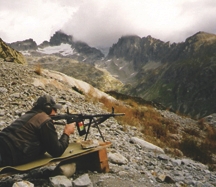
"... a social paradise concocted by politicians who believed that civilized society could only be made crime-free through the confiscation of all arms.``
Want to see that celebrated British stiff upper lip begin to quiver? Just mention to Parliament or press that England is not the isle of tranquility envisioned more than a century ago, when the nation began the systematic disarmament of its citizens.
After years of chipping away at private firearm ownership through passage of a rash of seemingly innocuous rules and regulations, with the adoption of a total handgun ban in 1997, the British achieved what was hailed as the "gold standard" of gun control. At the time, leading newspapers in England heralded this "restraint on personal liberty" as "essential to the happiness" of the country`s law-abiding.
The credo was a simple but vacuous one: fewer guns mean fewer crimes. Essentially, it was the legal intention that "nobody, except a soldier, sailor or policeman" should ever have access to a handgun. Simultaneously, the courts took up the cause, prosecuting those who resisted violent attacks with any sort of armed reaction. Over time, it became evident that predators were apt to be judged less harshly than victims who used any type of device, even a stout stick, in an act of self-defense.
According to the utopian scheme of things, gun bans were supposed to evoke a kinder and gentler world-a social paradise concocted by politicians who believed that civilized society could only be made crime-free through the confiscation of all arms. At the same time, it seemed pertinent for the government to also divest British citizenry of all normal human reactions regarding self-preservation.
The results have been as tragic as they were predictable.
A litany of failures were apparent as early as the year 2000, when CBS News reported that law and order in Britain was deteriorating at a rapid rate, while the country was experiencing a crime surge much more severe than any recorded within the United States.
"Have a nice daydream," was the retort fired back at CBS from editorialists with the London Mirror, the same daily newspaper fond of pointing out that the British crime rate was "nothing at all compared
to the Wild West culture on the other side of the Atlantic, where every other car is carrying a gun."
However, in time, in stories sandwiched between inside pages, the newspaper conceded that CBS was right. "Britain has overtaken the U.S. for all major crimes," the newspaper admitted. In fact, the motherland was indeed racing ahead by a substantial lead, sporting a crime rate in England and Wales that at times peaked at as much as 60 percent above crime statistics here in the States, with gun crimes especially prominent.
So how could a nation operating under an alleged discipline of total disarmament suddenly become victim to a spike of armed, violent crime? Especially a country that advanced the notion that individuals had a right to personal security more than 100 years before it became a fixture in America?
Consider that William Blackstone, an early British champion of working-class citizens, argued that the right of self-protection was one no government could take away. Another champion of individual rights, A.V. Dicey, cautioned that if the government discouraged self-help, then loyal subjects became the slaves of ruffians.
It`s no wonder that the U.S. Constitution would feature a Bill of Rights insisting on a Right to Keep and Bear Arms. For generations following the British insistence on equal rights for its citizens, including the right to self-defense, subjects of the Crown were among the safest and most law-abiding in the world, with a crime rate that truly was the envy of its neighbors.
Things began to disintegrate in the 20th century with the passage of laws that increasingly restricted private possession of firearms, along with edicts forbidding the right to carry arms for self-protection. Eventually, British law determined that even vigorous self-defense could only be "reasonable in the circumstances." By 1969, British police officers were told by higher authorities "it should never be necessary for anyone to possess a firearm for the protection of his house or person."
British wags were quick to point out that the justice system appeared to have its philosophical hat on backwards. One commentator said the courts seemed to regard the scandal of the killing of a robber as of greater consequence than the safety of the robber`s victim. Such comments soon were both numerous and scathing, and not without good reason.
Grumblings in the British press increasingly mirrored grassroots opinions about the plight of the law-abiding: "The monumentally useless British police, with greater manpower per capita, higher rates of pay and with far more lavish resources than the Americans, haven`t had an original idea in decades, so they cling ever more fiercely to their core ideology: the best way to deal with criminals is to impose ever greater restrictions and inconveniences on the law-abiding."
 |
| In 2002, the chances of being mugged in London were approximately six times greater than in New York City, cultural center of the "lawless Wild West" so often mocked by British snobbery. |
Another accused Tony Blair of going "total: blame everyone, ban everything."
Gang activity is certainly at the root of Britain`s climbing crime rate, and much of the lawlessness can be traced back to disaffected youth in England`s rust belt, where jobs are few and hope is diminishing.
Essentially, the firearm issue never has been about the guns themselves, but more about eroding social mores balanced against the rights of the individual. And while America has thus far managed to protect its Right to Keep and Bear Arms for self-protection (borrowed for use in our Constitution from the 1689 English Bill of Rights), many of the English rank and file clamor to have theirs back as societal mayhem takes advantage of the vacuum created by disarmament.
Dismayed Brits point to their country`s egregious gun laws, the toughest firearm restrictions of any democracy, and argue that they not only didn`t reduce violent crime but managed, as documented by the British press, to leave "law-abiding citizens at the mercy of criminals confident (their) victims have neither the means nor legal rights to resist them." The BBC reported that gun bans "seem to have little impact on the criminal underworld," while the use of handguns to commit crimes rose 40 percent during the two years following the total ban on them.
Simultaneously, the number of innocent citizens robbed at gunpoint rose some 53 percent. In 2002, the chances of being mugged in London were approximately six times greater than in New York City, cultural center of the "lawless Wild West" so often mocked by British snobbery. Overall, rates of assault, robbery and burglary shot past those recorded in America and, maybe most ominously, 53 percent of British burglaries were said to occur while the residents were still in their homes.
Even so, British lawmakers have stuck to the notion that people don`t need to protect themselves, because society can and will. And, in a defenseless populace besieged by a growing climate of violence, police urge individuals witnessing a crime to walk on by as if nothing had happened; to let the pros handle it . . . if only they could.
Contrast this to attitudes in the U.S., where law enforcement professionals are among the first to acknowledge that police can`t be everywhere and can`t protect everyone from criminal attack, and that in many instances individuals have not only a right but a responsibility to protect lives, family and property. At the same time, the majority of candid police officials in this country openly admit that it would be nearly impossible to rid the nation of firearms if guns were banned, or to keep illegal guns from entering the country.
British citizens have found this out the hard way. They found it out in a delivery truck allegedly loaded only with frozen pizzas, a truck with a Croatian driver carrying smuggled firearms in the midst of all that cheese and crust. They also found it in the post-war economy of the Balkans, a region accustomed to supplying guns to those willing to supply cash in return, no matter what laws may be on the books. They found it in the numbers of deactivated, collectible guns refitted to work on the street. And the English have found, to their dismay, that governmental decrees don`t necessarily receive consensus respect. There are and will continue to be firearms in Britain, even if Parliament demands the surrender of everything from fine double barrel skeet guns to the most common child`s air rifle. The proof, no matter the amount of bureaucratic gibberish to the contrary, continues to generate headlines that shock the nation.
British society remains outraged by stories like the one involving the murder of an 11-year-old boy, a bright and personable child walking home from football practice, gunned down for no apparent reason by another youth riding a bicycle. Brits have seen gunfire erupt in a courtroom when armed men sought to free two defendants in a nightclub shooting. They`ve listened to reports concerning two men killed by automatic gun fire in what had been a quiet residential neighborhood, and read headlines about the 19-year-old woman killed while walking along a main street in East London, murdered by thugs who sought to steal her cell phone.
According to the Manchester (England) Guardian, Manchester residents fear that the city is slipping into what they refer to as "Gunchester days" due to gang activity and shootings. And there`s little consolation to be found in the fact that Parliament promised it couldn`t happen, that the civilian population would be compensated for the loss of personal liberty by heightened law enforcement-a sad state of affairs from a country that gave the world the Magna Carta.
Maybe the most chilling scenarios generated by Britain`s attempt to legislate a disarmed society are the tribulations of those simply seeking to survive it. Take for instance the English homeowner who used a toy gun to detain burglars caught in his home. When police arrived, the homeowner himself was arrested for using a fake firearm to threaten or intimidate.
Or consider the plight of an elderly woman who fired a cap pistol in an attempt to frighten away a group of young rowdies who besieged her. She was arrested for placing someone in fear.
Or how about the businessman who, during a mugging, pulled an ornamental knife from his cane and used it to slash his way out of what he feared to be a deadly confrontation. Even though he thought he was on the verge of losing his life, the petroleum executive was convicted of carrying an "offensive weapon."
Rather than face the fact that gun control has actually opened a Pandora`s box of violence rather than closed the lid more tightly, an arrogant Parliament and societal upper crust have instead chosen to punish those they can most easily-the remaining Brits with backbone enough to fight for their rights as law-abiding citizens. After all, gangs and street toughs shoot back-and have the firearms to do so in spite of propaganda to the contrary.
In 1962, Anthony Burgess wrote a book called A Clockwork Orange, a futuristic look at random violence as a way of life among disenfranchised and desensitized British youth. The book would become the 1971 classic film of the same name by Stanley Kubrick.
At the time, the subject matter horrified viewers around the world. Yet today, they can watch much the same thing on British TV news.
Perhaps the time has come for Britain to rethink its restrictions on the rights of good citizens, and focus on the mayhem routinely practiced by the bad ones. If Parliament would only do the right thing and take necessary steps to reinstate the most basic human right of self-preservation, then maybe those of us here in the United States would resist the urge to say, "I told you so," and instead cheer the resurrection of liberty back in the land where it started.
|
Shooting in Exile British marksmen (and their guns) are fleeing to Switzerland. by RICHARD MUNDAY "Never give in," Winston Churchill once insisted to a younger generation, "Never give in, never, never, never ... never give in except to convictions of honor and good sense." The 1997 Firearms Acts, which banned the ownership of handguns in Britain, had neither honor nor good sense, and not all British pistol shooters were willing to surrender their guns and their sport. When the prohibition was announced, some shipped their arms abroad: to France, to Belgium, to Germany, to Norway, even to America. But as the implementation date of the pistol ban approached, a number of British pistol shooters were still in possession of their short arms, doggedly shooting competitively to the very end. What did this portend? It later emerged that in some police circles there was a certain unease about what these die-hards might do when the time came to forfeit their firearms. Then, with just days to go, the imagined possibility of trouble melted away-the last legal handguns in Britain were exported, to reappear swiftly on the firing line of target ranges in Switzerland. Ten years ago on a pistol range above the Lake of Thun in the Bernese Oberland, the first championship meeting of the British Alpine Rifles (BAR) began. Authorization for the importation of the firearms and the establishment of BAR went all the way up to the final approval of the president of Switzerland. What sort of characters were these, banned from their own country and wanting to shoot here? As refugees, they were certainly unusual, counting the better part of a dozen members of the House of Lords who had opposed the pistol ban among their honorary members, and a former attorney general.
At BAR`s inaugural meeting in Switzerland, one of its members, a Cambridge medical doctor specializing in cancer research (which he considered more serious than the threat to life notionally posed by Olympic pistol shooting), sent Britain`s home secretary a postcard: "Wish you were here ..." Perhaps Home Secretary Jack Straw, the government minister responsible for implementing the pistol ban, would have been uncertain how he would have been received. Yet had he come, some of his government`s foolish notions might have been dispelled. Fortunately, the Swiss had no such qualms about the armed Brits. When a couple of passing policemen were invited onto the range, they joined in the BAR competitions. They distinguished themselves with their service side arms (winning BAR medals), and returned a couple of days later with an engraved prize for the British club. The Swiss generally shook their heads in disbelief at what had happened to the British target shooters, and everywhere extended them a warm welcome. In Switzerland, shooting is not yet a taboo sport whose practitioners are regarded with suspicion. Shooters are, on the contrary, still seen as the solid backbone of the country. In just one rural parish where BAR meets, there are 10 active rifle and pistol ranges, and the people still cycle down the road to shoot-with semi-auto rifles slung over their shoulders. How could Britain, which once also had such a strong shooting tradition, have changed so much? And what had happened to the democratic process, the Swiss asked, in a country that now exiled respectable citizens? It seemed all the more bizarre when they discovered that the patron of these sporting asylum seekers was no less than the Duke of Edinburgh, husband of the Queen. It was this Swiss asylum that enabled BAR to preserve Britain`s target pistol shooting traditions. The 40 events of the inaugural BAR championships in 1997 have grown to 100 today, covering not only the full gamut of the International Sport Shooting Federation`s disciplines, but also Britain`s own Police and Service courses, and old Bisley matches resurrected from the Edwardian age, like the "Advancing Men" and the "Running Burglar" shot on moving figure targets. You see, the members of the British Alpine Rifles do not care much for modern "political correctness."
Along with its pistol program, BAR also runs a spectrum of rifle events. Swiss long gun competition is still based on the service rifle, and BAR marksmen, using semi-auto rifles banned in Britain by the previous Firearms Act of 1988, have been happy to follow suit. At BAR`s jubilee championships this fall, they shot a new match named after Lt. General Sir Philip Neame, a winner both of the Victoria Cross (Britain`s equivalent of the Medal of Honor) and an Olympic gold in rifle shooting in the 1920s. Another BAR combined rifle and pistol match is named for Colonel Mark Beaufoy, who in 1787 was the first Englishman to climb Mont Blanc, and then went on in 1809 to write a treatise on rifle shooting, recommending the formation of rifle clubs throughout Britain-an aim realized half a century later with the foundation in London in 1859 of the National Rifle Association of Great Britain, forerunner of America`s NRA. Today`s members of the British Alpine Rifles are heirs to a long tradition in which they take great pride. At their formal dinners, when they meet back in England, their toast is, "The Queen; but not her government." |














 More Like This From Around The NRA
More Like This From Around The NRA







